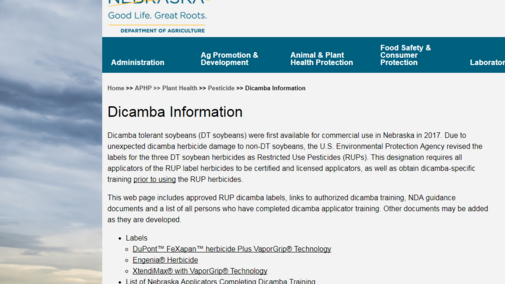The following article is reprinted with persmission from the Winter 2017-18 Nebraska Department of Agriculture Pesticide, Fertilizer & Noxious Weed Newsletter.
Dicamba registration might be the biggest issue the Pesticide Program has faced since the program began in 1994. Having been directly involved in the administration of Pesticide Program since the enabling legislation was signed by Governor Ben Nelson in 1993, nothing compares to what our agency and many soybean farmers experienced this past summer. The issues and concerns need to be fully understood in order for everyone to move into the 2018 growing season with their eyes wide open.
Changes to RUP dicamba labels
- Dicamba/auxin-specific training will be required for all applicators to use any of the RUP dicamba products.
- Label-mandated recordkeeping for all users.
- Applications restricted to wind speeds between 3-10 mph.
- Applications limited to daytime hours between sunrise and sunset.
- Revised tank cleanout requirements.
- Additional requirements for sensitive crop scouting, including non-dicamba tolerant soybeans and specialty crops.
Perhaps the biggest question on the mind of many soybean growers is whether NDA will register the new dicamba herbicide formulations for 2018. The answer is yes, we have notified all three registrants (DuPont, BASF and Monsanto) that NDA will accept their revised labels for the 2018 growing season. All three products (Xtendimax® with Vapor Grip® Technology, Fexapan® with Vapor Grip® Technology and Engenia®) were conditionally registered by EPA for two years (2017 and 2018), and NDA cannot extend that time period without EPA doing so first.
A second frequently asked question is what did NDA experience this past growing season in the way of claims or complaints of potential dicamba damage. There were over 90 claims received by NDA beginning on June 20, and NDA was able to begin full investigations of 23 of those claims. At this time, NDA continues to review the evidence collected in the full investigations, to detect common themes which can be addressed in applicator education, which leads me to the next very important point.
Recently, EPA announced an agreement with the three dicamba registrants to classify the new dicamba formulations as Restricted Use Pesticides (RUPs). The RUP classification will now require all applicators to possess a Nebraska Pesticide Applicator License before applying any of the three new dicamba products. For commercial and non-commercial applicators, that means your license must have the Ag Plant category (category 01). For private applicators, your license covers you for all agricultural uses. HOWEVER, there is one very important addition to applicator certification that MUST be completed before any applicator applies the RUP dicamba products, and that is the addition of dicamba/auxin-specific training.
Dicamba/auxin-specific training will be required for any applicator of the RUP dicamba products (private, commercial, or noncommercial). NDA is working closely with the University of Nebraska Pesticide Safety Education Program to develop NDA-authorized training, and NDA has notified the three dicamba registrants of our intention to require the UNL training components into all trainings offered in Nebraska. It will be the requirement of the applicator to obtain this training before they can apply the RUP dicamba. NDA will maintain a database of all properly trained applicators, which will be accessible to dealers on NDA’s Dicamba Information website.
In addition to classifying the three new dicamba products as RUPs, EPA required a number of changes to the labels for the 2018 growing season. The labels for the dicamba products now have mandatory record keeping, a reduced maximum wind speed (from 15 miles per hour down to 10 miles per hour), limited times of day applications can be made (between sunrise and sunset), revised tank clean-out language, and a revised list of susceptible crops and sensitive sites. The full list of what has changed on the new dicamba labels is rather large, and NDA will post the changes to our website by the end of December. The dicamba/auxin-specific training now required for all applicators will also cover these changes in detail.
As NDA and soybean growers move into the 2018 growing season, it is quite likely additional information and communications on dicamba-tolerant soybeans and the use of dicamba will be released. NDA is developing a dicamba-specific messaging page on its website for any updates, press releases or revised requirements for RUP dicamba applications. Please visit our website at nda.nebraska.gov, including the Dicamba Information page, and bookmark it so you can quickly check it when needed.

